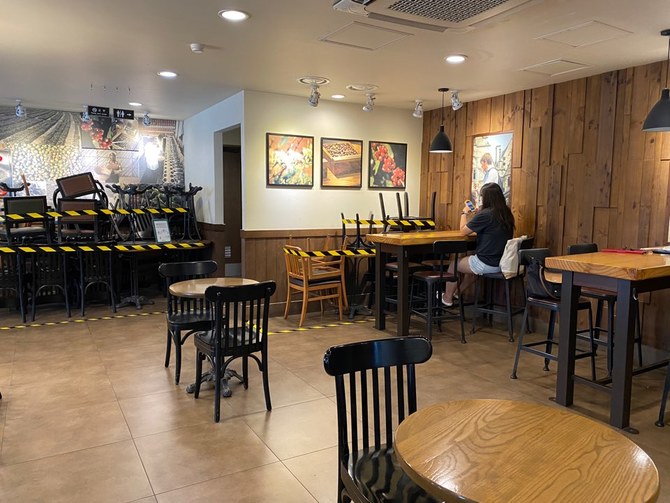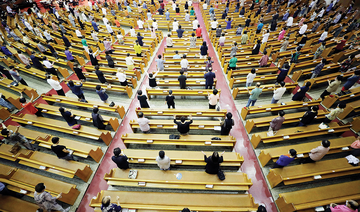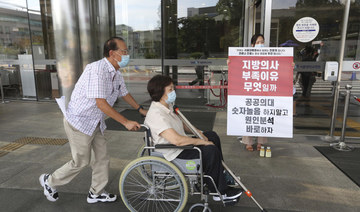SEOUL: South Korea’s coronavirus cases could surge to as much as 2,000 per day in a week, health authorities warned on Saturday, as new infections continue to pile up.
The warning came ahead of tighter restrictions on coffee shops, restaurants and other businesses in the Seoul metropolitan area for a week.
“Extending the social distancing campaign in the wider Seoul area is an inevitable choice to prevent bigger socio-economic losses,” Health Minister Park Neung-hoo said at a press briefing. “I ask owners of coffee chains, restaurants and other businesses to actively cooperate with the order despite frustration.”
Under the “Level 2.5” social distancing rules, only takeout and delivery services are permitted in franchise coffee chains from 9 p.m. to 5 a.m. Restaurants and bakeries are allowed to operate until 9 p.m. until Sept. 6.
Around 28,000 indoor sports facilities, such as gyms and public swimming pools, will also be included in the social distancing campaign.
“I used to read books at cafes on the weekend, but I can’t do it from tomorrow,” Min Seon-hee, a 22-year-old university student, told Arab News. “It’s sad, but I believe this is the right decision to prevent the resurgence of the virus.”
An owner of a fitness club in central Seoul was worried about the economic losses he would have to incur in case the maximum social distancing rules were imposed.
“We have to abide by the rules and regulations imposed by the government,” he told Arab News, requesting anonymity. “I’m just concerned that my business will be compromised significantly when the social distancing level goes up to three.”
Yoon Tae-ho, director general for public health at the ministry, told the news briefing that the current situation in the greater Seoul area was so severe that more powerful social distancing was required.
“There will be no other choice but to raise the social distancing to the highest Level 3 unless the surge in coronavirus cases is blunted, ” he said.
If imposed, the Level 3 guidelines would mean a ban on all public gatherings and events of over 10 people as well as all sporting events.
Some experts, however, suggested that the government up social distancing to the maximum level as soon as possible to help flatten the curve.
“There is a misunderstanding about the Level 3 restrictions,” Dr. Kim Woo-joo, a professor for infectious diseases at Korea University in Seoul, told Arab News. “Many people believe Level 3 is related to lockdown, but that’s not true. Implementing Level 3 measures in a short period of time would be more helpful in preventing the virus spread as well as lessening the pandemic impact on the economy.”
All public and private facilities will also remain shut except for essential economic and social purposes.
According to the Korea Centers for Disease Control and Prevention (KCDC), the country reported 323 new COVID-19 cases on Saturday, raising the total to 19,400. Five more patients died, bringing the death toll to 321.
Saturday’s tally marked a drop from the previous day when 371 new cases were reported, but the number of daily infections has remained in triple digits for more than two weeks.
Out of the new cases reported, 244 were identified in the capital area, namely Seoul, Gyeonggi Province and Incheon, which is home to half of the country’s 51 million population.
Seoul added 124 more cases, while the surrounding Gyeonggi Province and the western port city of Incheon reported 100 and 20 patients respectively, according to the KCDC.
The number of daily new infections in the 300 range among a population of 51 million would be the envy of many nations.
But President Moon Jae-in’s government is being blamed for the spike as it was confident about having the crisis under control.
The second wave came about two weeks after social distancing regulations were relaxed. The government decreed an extra holiday to commemorate the occasion and handed out hundreds of thousands of discount coupons for hotels, cinemas and restaurants to help out the economy.
“The government was self-congratulatory and laid back after its initial success,” Rep. Kim Mi-ae, of the main opposition United Future Party, said during a parliamentary session on Aug. 26. “They were just satisfied with praise from the world for their successful quarantine efforts, but I think that made people relax in mid-August.”
While fears grow over a fresh wave of COVID-19 infections, the government and a doctors’ association are on a collision course.
The Korea Medical Association said on Friday that it would stage a nationwide strike starting Sept. 7, denouncing the president’s medical reform plans which aim to increase the number of medical students over several years by establishing public medical schools.
Almost 16,000 intern and resident doctors have been on strike since Aug. 21, with nearly a quarter of the country’s 33,000 hospitals and clinics closed on Friday.
It follows the Health Ministry issuing back-to-work orders for doctors, before filing a complaint with the police against at least 10 doctors who refused to follow it.
“We strongly denounce the government for filing a complaint for criminal charges within just a day for refusing to comply with the order,” the association’s president Choi Dae-zip said before seeking a retraction of the reform plans.
The walkout has forced several major hospitals in the greater Seoul area to reduce their working hours.
Starting next week, Seoul National University, one of the country's major general hospitals, said clinic hours would be shortened in a bid to reduce the work of professor-level doctors.






















